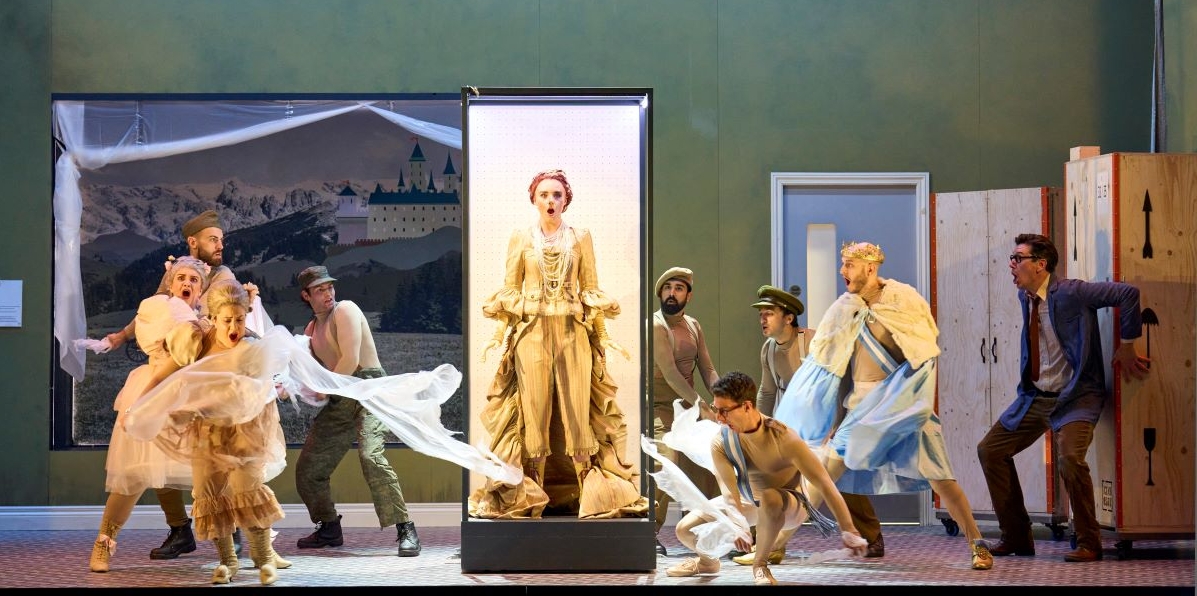La Cenerentola and Il Barbiere di Seviglia are Rossini’s greatest comedies. La Cenerentola was composed in 24 days, and a huge success in 1817. The comedy should be paramount and gags found where they are not obvious. Rossini should fizz like champagne; this is flat prosecco.
There is a new, good, English libretto. But why do ETO think it is an improvement to translate a brilliant Italian libretto into not brilliant English? There are subtitles anyway. Yes, English has many words ending in ‘tion’ but that neither translates the original, nor is it onomatopoeically funny. Translated patter songs lose the ping. Yet again the dreadful phrase heard in Poppea – take a hike – appears. Contemporary sort of, but not funny. Rossini’s gags lie in the language. One phrase could not be translated, so it is left in Italian -sotto voce- three ‘o’ vowels, and pings. ‘Innocenza’, three vowels in the same closed vocal space, opening out in warmth on the ‘e’ becomes ‘I choose virtue’ which is not a translation,’ I’ is a dipthong (ai), flipping from open to closed vowels. Three phrases on the wall in the museum for example ‘la mia vendetta’ all derive from Cenerentola’s music. They are in the original Italian and not translated. That makes no sense.
This rendition takes place after closing time in a gallery; the characters, except Alindoro, a curator, are exhibits, appearing in exhibit boxes. At the end, Alindoro, the Prince’s fixer, becomes the exhibit and Cenerentola leaves the exhibition in modern dress: again, making no sense and kills the romantic joy. Triumph of Goodness – the alternative title, is there for a reason and ignored. Flesh coloured bodysuits and hairnets are the costumes, as the characters are mannequins, are drab and unflattering. Soldiers bearing no relation to anything except maybe from the same Napoleon exhibit as Cenerentola’s father dressed as Napoleon (?!), appear as the chorus. The characters cannot develop properly, because they are constantly stuck in their boxes.
I have sung Cenerentola in Italian. In my Ricordi score the quartet ‘questo è un nodo avviluppato, questo è un gruppo rintrecciato’ lasts 15 pages. You must over-emphasise some consonants, especially the double consonants, and really roll the r’s. This number requires the famous Rossini crescendos, picking up pace, excitement and played for maximum laughs, otherwise the 15 pages of repeats drags. The English libretto is clumsy in comparison, got no laughs, and drags because the Canadian conductor Naomi Woo neither makes any recognisable crescendo, nor picks up pace and excitement. It is limp. Flat prosecco. This is something that can improve on tour.
The sisters are always nasty, but never abusive. When they return from the ball, they, and Cenerentola’s father tell her to make supper. Then they all beat, kick and punch her. This is a cheap way of jumping on the ‘abuse’ bandwagon, to ‘make it relevant today’, but it has no place in an opera buffa fairy story – there is nothing funny about it, not what Rossini intended, nor anything to do with la Bontà in Triompho.
It is a young cast, and the singing is good.
British mezzo Esme Bronwen-Smith as Cenerentola knocked off the coloratura with ease, especially the rondo finale; the voice is warm, although the acting is a little wooden, maybe this is intentional as she is an exhibit? Another example of characters in boxes not being allowed to develop.
Anglo-Irish tenor Joseph Doody has a lovely vibrant instrument, sings the difficult role of Ramiro with all top notes and coloratura with ease. The glasses, making him look too nerdy (and not an exhibition exhibit), might work better if Cenerentola also wore nerdy glasses, then it’s a match!
British bass Edward Hawkins, has a warm bass voice and is an extremely sympathetic Alidoro. British bass Edmund Danon is a suitably flirty Dandini.
Armenian baritone Ashak Duzikayn as Don Magnifico sings well, but instead of being the dreadful dad, depriving his daughter of her dowry and treating her badly, he could have made more of the conflicted character and shown some regret.
Soprano Lauren Young as Tisbe and mezzo Nazan Fikret as Clorinda both have strong voices, worked well together and are suitably horrible as the sisters.
The ETO’s aim is to introduce more opera-lovers to all ages. Longevity is an important criterion for new productions; this production is unlikely to have audiences wanting more.

